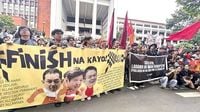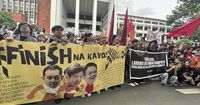In the Philippines, a storm of controversy has erupted over massive corruption allegations tied to flood control projects, putting President Ferdinand Marcos Jr. and his administration squarely in the public spotlight. Yet as the scandal simmers, the country’s top defense and military officials have drawn a clear line: the armed forces will not be drawn into political upheaval, even as calls for a dramatic “people power” revolt echo the nation’s turbulent past.
On September 12, 2025, Philippine Secretary of National Defense Gilbert Teodoro Jr. and Armed Forces of the Philippines Chief of Staff General Romeo Brawner Jr. issued a firm, united statement. They rejected “all attempts to patronize the Armed Forces of the Philippines by certain groups that insinuate or suggest unconstitutional, unilateral interventions.” Their message, reported by the Associated Press, was unmistakable: the 160,000-strong military is non-partisan, professional, and “abides by the constitution through the chain-of-command.” In a country where the military has played pivotal roles in past regime changes, this declaration carried particular weight.
The roots of the current crisis lie in a sprawling investigation into the country’s flood mitigation projects. Over the last three years, the Philippines has spent an estimated 545 billion pesos (about $9.6 billion) on thousands of these projects. According to televised inquiries led by the House of Representatives, the Senate, and the Marcos administration, many projects were found to be either substandard or entirely non-existent. President Marcos himself led inspections in flood-prone provinces such as Bulacan, uncovering what he called “horrible” anomalies.
The fallout has been swift and severe. Dozens of legislators, senators, construction companies, and public works engineers have been accused of pocketing huge kickbacks. These illicit funds, investigators allege, financed everything from lavish lifestyles to high-stakes casino gambling. The scandal is especially sensitive in the Philippines, a country where poverty is widespread and deadly typhoons and floods routinely devastate entire towns and villages. The idea that public money meant to protect vulnerable communities may have been siphoned off for personal gain has understandably fueled public outrage.
Yet, unlike the violent protests seen recently in places like Nepal and Indonesia, the Philippine response has been notably measured. Street rallies have remained relatively small and peaceful. Much of the anger has instead been vented online, amplified by voices from across society — from Catholic church leaders and business executives to retired generals.
During one recent rally, a speaker called on the military to withdraw its loyalty from President Marcos and urged Filipinos to stage a non-violent “people power” revolt, reminiscent of the army-backed uprisings that ousted Ferdinand Marcos Sr. in 1986 and Joseph Estrada in 2001. These references to the Philippines’ history of dramatic, military-influenced political change have not gone unnoticed. But the country’s current defense leadership has made it clear: they are not interested in repeating that history.
“At this critical juncture for our national security in the face of threats to our peace and regional stability, politically motivated attempts to distract the Armed Forces of the Philippines from focusing on its mission are not only futile but also irresponsible,” Teodoro and Brawner stated, as reported by the Associated Press. They expressed support for the ongoing anti-corruption investigation led by President Marcos, emphasizing, “The strength of our republic rests on the rule of law and the unity of our people. At this crucial time, we call on every Filipino to place their trust in our democratic institutions, to respect our processes.”
The government’s response to the scandal has been multifaceted. President Marcos established an independent commission to dig into the “massive anomalies” uncovered in the flood control program. He also took the dramatic step of withholding funding for flood control projects for at least the next year, pending the outcome of the review. The Secretary of Public Works and Highways, Manuel M. Bonoan, resigned amid the growing furor. Investigations continue, with televised hearings keeping the public informed — and, in many cases, outraged.
Despite the heated atmosphere, there appears to be little appetite within the military or police for intervention. Two high-ranking national security and defense officials, speaking to the Associated Press on condition of anonymity, stated there is no monitored threat of secessionism or coup plotting within the ranks. Their assessment is echoed in a confidential government security report, which concluded that “drastic movements in the military and other uniformed service are very unlikely due to strong loyalty and patriotism … to the constitution, the flag, and the president.” The report also noted that while groups opposed to Marcos have joined the public outcry, a major “people power” uprising is highly unlikely without the military’s support.
It’s a marked contrast from the Philippines’ not-so-distant past, when military defections played decisive roles in toppling presidents. The current leadership’s insistence on constitutionalism and non-partisanship is a clear signal to both supporters and critics: the armed forces see their duty as defending the nation, not picking political winners or losers.
Meanwhile, the broader investigation into flood control corruption continues to unfold. The sums involved are staggering — nearly $10 billion spent in just three years, with the fate of thousands of projects now under review. For ordinary Filipinos, many of whom have endured the devastating consequences of poorly managed floodwaters, the revelations are both infuriating and deeply personal. The prospect that money meant to protect their homes and livelihoods may have vanished into the pockets of the powerful is a bitter pill to swallow.
Yet, even as frustration simmers, the country’s democratic institutions are being put to the test. Legislators, senators, and administration officials are all under scrutiny, and the proceedings are playing out in the public eye. The hope, for many, is that this moment of crisis might finally lead to lasting reforms — not just in flood control, but in the broader fight against corruption that has long plagued the Philippines.
For now, the military’s stance has provided a measure of stability, even as the political landscape remains unsettled. The message from the top brass is clear: the rule of law, not the rule of the gun, must prevail. Whether that will be enough to restore public trust remains to be seen, but it’s a stance that, for the moment, seems to be holding the line against chaos.


